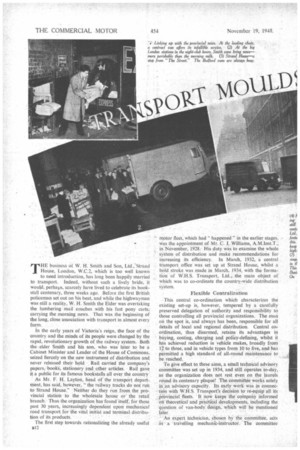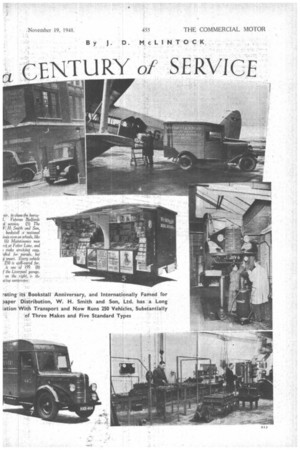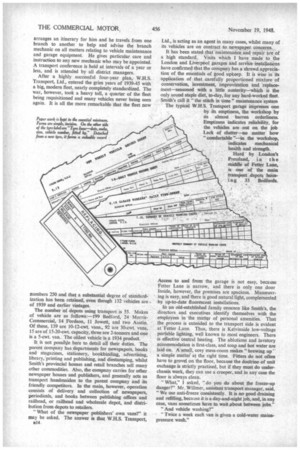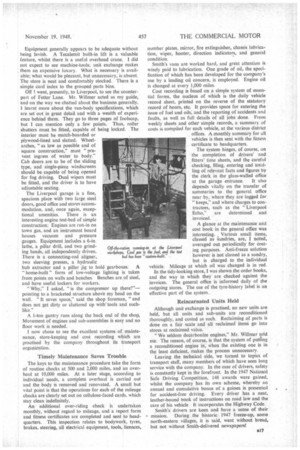LD
Page 46

Page 47

Page 48

Page 51

If you've noticed an error in this article please click here to report it so we can fix it.
a CENTURY of SERVICE
By J. D. McLINTOCK
THE business of W. H. Smith and Son, Ltd.:Strand House, London, W.C.2, which is too well known to need introduction, has long been happily married to transport. Indeed, without such a lively bride, it would, perhaps, scarcely have lived to celebrate its bookstall centenary, three weeks ago. Before the first British policeman set out on his beat, and while the highwayman was still a reality, W. H. Smith the Elder was overtaking the lumbering mail coaches with his fast pony carts; carrying the morning news. That was the beginning of the long, close association with transport in almost every form.
In the early years of Victoria's reign, the face of the country and the minds of its people were changed by the rapid, revolutionary growth of the railway system. Both the . elder Smith and his son, who was later to be a Cabinet Minister and Leader of the House of Commons, seized fiercely on the new instrument of distribution and never released their hold Rail carried the company's papers ,• books; stationery and .other articles. Rail gave it a public for its famous bookstalls all over the country As Mr. F. H. Layton, head or the transport depart-. ment, has said, however, " the railway tracks do not run to Strand House." Neither do they run from the provincial station to the wholesale house or the retail branch. Thus the organization has found itself, for these past 30 years, increasingly dependent upon mechanical' road transport for the vital initial and terminal distribution of its products.
The first step towards rationalizing the already useful al2 motor fleet, which had " happened " in the earlier stages, was the appointment of Mr. C. J. Williams, A.M.Inst.T., in November, 1928. His duty was to examine the whole system of distribution and make recommendations for increasing its efficiency. In March, 1932, a central transport office was set up at Strand House, whilst a bold stroke was made in March, 1934, with the formation of W.H.S. Transport, Ltd., the main object of which was to co-ordinate the country-wide distribution system.
Flexible Centralization This central co-ordination which characterizes the existing set-up is, however, tempered by a carefully preserved delegation of authority and responsibility to those controlling all provincial organizations. The man on the spot is, and always has been, responsible for all details of local and regional distribution. Central coordination, thus disarmed, retains its advantages in buying, costing, charging and policy-defining, whilst it has achieved reduction in vehicle makes, broadly from 12 to three, and in vehicle types from 10 to five, and has permitted a high standard of all-round maintenance to be reached.
To give effect to these aims, a small technical advisory committee was set up in 1934, and still operates to-day, as the organization does not rest even, on the laurels round its centenary plaque! The committee works solely in_an advisory capacity. Its early work was in connection with W.H.S. Transport's decision to re equip all its Prbvincial fleets. It now keeps the company informed on theoretical and practical developments, including the question of van-body. design, which will be mentioned
later. .
An expert technician, chosen by the committee, acts ás a .traVelling mechank-Mitructor. The committee arranges an itinerary for him and he travels from one branch to another to help and advise the branch mechanic on all matters relating to vehicle maintenance and garage equipment. He gives particular care and instruction to any new mechanic who may be appointed. A transport conference is held at intervals of a year or less, and is attended by all district managers.
After a highly successful four-year plan, W.H.S. Transport, Ltd., entered the grim years of 1939-45 with a big, modern fleet, nearly completely standardized. The war, however, took a heavy toll, a quarter of the fleet being requisitioned and many vehicles never being seen again. It is all the more remarkable that the fleet now numbers 250 and that a substantial degree of standardization has been retained, even though 132 vehicles are of 1939 and earlier vintages.
The number of depots using transport is 55. Makes of vehicle are as follows:-199 Bedford, 24 MorrisCommercial, 14 Fordson, 11 Jowett, and two Austin. Of these, 139 are 10-I2-cwt. vans., 92 are 30-cwt. vans, 15 are of 15-20-cwt. capacity, three are 2-tonners and one is a 5-cwt. van. The oldest vehicle is a 1934 product.
It is not possihle here to detail all their duties. The parent company has departments for newspapers, books and magazines, stationery, bookbinding, advertising, library, printing and publishing, and diestamping, whilst Smith's provincial houses and retail branches sell many other commodities. Also, the company carries for other newspaper houses and publishers, and generally acts as transport handmaiden to the parent company and its friendly competitors. In the main, however, operation consists of delivery and collection of newspapers, periodicals, and books between publishing offices and railhead, or railhead and wholesale depot, and distribution from depots to retailers.
"What of the newspaper publishers' own vans?" it may be asked. The answer is that W.H.S. Transport, Ltd., is acting as an agent in many cases, whilst many of its vehicles are on contract to newspaper concerns. It has been stated that maintenance and repair are of a high standard. Visits which I have made to the London and Liverpool garages and service installations have confirmed that the company has a shrewd appreciation of the essentials of good upkeep. It is wise in its application of that carefully proportioned mixture of conservation, investment, improvization and replacement—seasoned with a little austerity—which is the only sound staple diet, to-day, for any hard-worked fleet. Smith's call it "the stitch in time" maintenance system The typical W.H.S. Transport garage impresses one by its emptiness, the workshop by its almost barren orderliness. Emptiness indicates reliability, for the vehicles are out on the job Lack of clutter—no matter how " comfortable "—in the workshop, indicates mechanical health and strength.
Hard by London's Pressland, in the middle of Fetter Lane, is one of the main transport depots housing 33 Bedfords.
Access to and from the garage is not easy, because Fetter Lane is narrow, and there is only one door Inside, however, the premises are spacious. Manceuvring is easy, and there is good natural light, complemented by up-to-date fluorescent installations.
In an old-established family concern like Smith's, the directors and executives identify themselves with the employees in the matter of personal amenities. That the process is extended to the transport side is evident at Fetter .Lane. Thus, there is Kelvinside low-voltage portable lighting, well known to most engineers. There is effective central heating. The ablutions and lavatory accommodation is first-class, and soap and hot water are laid on. A'small, cosy mess-room makes " brewing up ' a simple matter at the right time. Fitters do not often have to grovel on the floor, because the doctrine of unii exchange is strictly practised, but if they must do underchassis work, they can use a creeper, and in any case the floor is always clean.
"What," I asked, "do you do about the freeze-up danger?" Mr. Willmer, assistant transport manager, said. " We use anti-freeze consistently. It is no good draining and refilling, because it is a day-and-night job, and, in any case, vans sometimes have to wait about between jobs " "And vehicle washing?"
"Twice a week each van is given a cold-water mainspressure wash."
Equipment generally appears to be adequate without being lavish. A Tecalemit built-in lift is a valuable feature, whilst there is a useful overhead crane. I did not expect to see machine-tools; unit exchange makes _ them an expensive luxury. What is necessary is available; what would be pleasant, but unnecessary, is absent. The store is neat and comfortably stocked. There is a simple card index to the grouped parts bins.
Off ! went, presently, to Liverpool, to see the counterpart of Fetter Lane. Mr. Willmer acted as my guide, and on the way we chatted about the business generally. I learnt more about the van-body specifications, which are set out in great detail and with a wealth of experience behind them. They go to three pages of foolscap, but 1 can mention only a few points. Thus, roller shutters must be fitted, capable of being locked. The interior must be match-boarded or plywood-lined and slatted. Wheel. arches, "as low as possible and of square construction," must "prevent ingress of water to body." Cab doors are to be of the sliding type, and single-piece windscreens should be capable of being opened for fog driving. Dual wipers must be fitted, and the driver is to have adjustable seating.
The Liverpool garage is a fine, spacious place with two large steel doors, good office and stores accommodation, and, once again, exceptional amenities. There is an interesting engine test-bed of simple construction. Engines are run-in on town gas, and an instrument board houses vacuum and pressure gauges. Equipment includes a 6-in. lathe, a pillar drill, and two grinding heads, all independently driven. There is a connecting-rod aligner, two sleeving presses, a hydraulic hub extractor and a pillar jig to hold gearboxes. A " home-built " form of low-voltage lighting is taken from points on walls and benches. Benches are of steel, andhave useful lockers for workers.
"Why," I asked, "is the compressor up there?"— pointing to a bracketed structure aboVe my head on the wall. "It saves space," said the shop foreman, "and does not get dirty or cluttered tip with' tools and suchlike."
A 1-ton gantry runs along the back end of the shop, Movement of engines and sub-assemblies is easy and no floor work is needed.
I now chose to see the excellent systems of maintenance, store-keeping and cost recording which are practised by the company throughout its transport organization.
Timely Maintenance Saves Trouble
The keys to the maintenance procedure take the form of routine checks at 500 and 2,000 miles, and an overhaul at 10,000 miles. At a later stage, according to individual needs, a complete overhaul is carried out and the body is removed and renovated. A small but vital point is that the operations for each of the mileage checks are clearly set out on cellulose-faced cards, which stay clean indefinitely.
An additional over-riding check is undertaken monthly, without regard to mileage, and a report form and fitness certificates are completed and sent to headquarters. This inspection relates to bodywork, tyres, brakes, steering, all electrical equipment, tools, licences, number plates, mirror, fire extinguisher, chassis lubrication, wiper, hooter, direction indicators, and general condition.
Smith's vans are worked hard, and great attention is wisely paid to lubrication. One grade of oil, the specification of which has been developed for the company's use by a leading oil concern, is employed. Engine oil is changed at every 1,000 miles.
Cost recording is based on a simple system of essential forms, the nucleus of which is the daily vehicle record sheet. printed on the reverse of the statutory record of hours, etc. It provides space for entering the issue of fuel and oils; and the reporting of accidents and faults, as well as full details of all jobs done. From weekly sheets and other simple records, a summary of costs is compiled breach vehicle, at the various district
offices. A monthly summary for all vehicles is then sent with the fitness certificate to headquarters.
The system hinges, of course, on the completion of drivers' and fitters' time sheets, and the careful checking, filing, entering and totalling of relevant facts and figures by the clerk in the glass-walled office at the garage entrance. It also depends vitally on the transfer of summaries to the general office near by, where they are logged for "keeps," and where charges to contractees, such as the "Liverpool Echo," are determined and invoiced.
A glance at the maintenance and cost book in the general office was interesting.small items, classed as undries, are, I noted, averaged out periodically for Costing purposes. Anti-freeze solution however is not classed as a sundry, but is charged to the individual
vehicle. Mileage at which oil was changed is in red.
In the tidy-looking store, I was shown the order books, and the way in which they are checked against the invoices. The general office is informed daily of the outgoing stores. The use of the tyre-history label is an effective part of the system., Reincarnated Units Held Although unit exchange is practised, no new units are held, but all units and sub-units are reconditioned thoroughly, and costed as such. Reclaiming of parts is done on a fair scale and all reclaimed items go into stores at reclaimed value.
"We seldom decarbonize engines," Mr. Willrner told me. The reason, of course, is that the system of putting a reconditioned engine in, when the existing one is in the least deficient, makes the process unnecessary.
Leaving the technical side, we turned to topics of transport staff, many members of which have seen long service with the company. In the case of drivers, safety is constantly kept in the forefront. In the 1947 National Safe Driving Competition, 148 awards were gained, whilst the company has its own scheme, whereby an annual and cumulative bonus of a guinea is presented for accident-free driving. Every driver has a neat, leather-bound book of instructions on road law and the care of his vehicle It incorporates the Highway Code.
Smith's drivers are keen and have a sense of their mission. During the historic. 1947 freeze-up, some north-eastern villages, it is said, went without bread, but not without Smith-delivered newspapers!




























































































